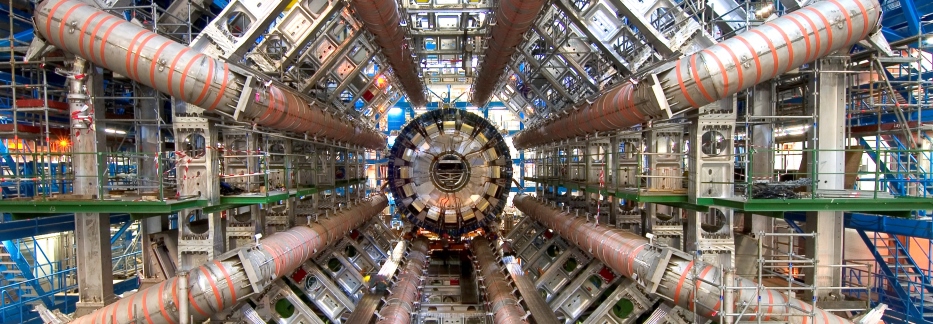The views expressed in our content reflect individual perspectives and do not represent the authoritative views of the Baha'i Faith.
The virtues of humanity are many but science is the most noble of them all. The distinction which man enjoys above and beyond the station of the animal is due to this paramount virtue. It is a bestowal of God; it is not material, it is divine. Science is an effulgence of the Sun of Reality, the power of investigating and discovering the verities of the universe, the means by which man finds a pathway to God. All the powers and attributes of man are human and hereditary in origin, outcomes of nature’s processes, except the intellect, which is supernatural. Through intellectual and intelligent inquiry science is the discoverer of all things. It unites present and past, reveals the history of bygone nations and events, and confers upon man today the essence of all human knowledge and attainment throughout the ages. By intellectual processes and logical deductions of reason, this super-power in man can penetrate the mysteries of the future and anticipate its happenings.
Abdu’l-Baha (Foundations of World Unity, pp 60)
You May Also Like
Comments

















"The virtues of humanity are many but science is the most noble of them all. The distinction which man enjoys above and beyond the station of the animal is due to this paramount virtue. It is a bestowal of God; it is not material, it is divine. Science is an effulgence of the Sun of Reality, the power of investigating and discovering the verities of the universe, the means by which man finds a pathway to God. All the powers and attributes of man are human and hereditary in origin, outcomes of nature’s processes, except the intellect, which is supernatural. Through intellectual and intelligent inquiry science is the discoverer of all things. It unites present and past, reveals the history of bygone nations and events, and confers upon man today the essence of all human knowledge and attainment throughout the ages. By intellectual processes and logical deductions of reason, this super-power in man can penetrate the mysteries of the future and anticipate its happenings." Abdu’l-Baha (Foundations of World Unity, pp 60)
I think you might find the following extract of some interest as it seeming addresses some of the underlying issues and principles of concern to you: In a letter to Dr. August Forel in the early 1900s, Abdu'l-Baha, the son of Baha'u'llah the Founder of the Baha'i Faith, wrote:
"By materialists, whose belief with regard to Divinity hath been explained, is not meant philosophers in general, but rather that group of materialists of narrow vision who worship that which is sensed, who depend upon the five senses only, and whose criterion of knowledge is limited to that which can be perceived by the senses. All that can be sensed is to them real, whilst whatever falleth not under the power of the senses is either unreal or doubtful. The existence of the Deity they regard as wholly doubtful.
"It is as thou hast written, not philosophers in general but narrow-minded materialists that are meant. As to deistic philosophers, such as Socrates, Plato and Aristotle, they are indeed worthy of esteem and of the highest praise, for they have rendered distinguished services to mankind. In like manner we regard the materialistic, accomplished, moderate philosophers, who have been of service (to mankind).
"We regard knowledge and wisdom as the foundation of the progress of mankind, and extol philosophers who are endowed with broad vision. Peruse carefully the San Francisco University Journal that the truth may be revealed to thee.
"Now concerning mental faculties, they are in truth of the inherent properties of the soul, even as the radiation of light is the essential property of the sun. The rays of the sun are renewed but the sun itself is ever the same and unchanged. Consider how the human intellect develops and weakens, and may at times come to naught, whereas the soul changeth not. For the mind to manifest itself, the human body must be whole; and a sound mind cannot be but in a sound body, whereas the soul dependeth not upon the body. It is through the power of the soul that the mind comprehendeth, imagineth and exerteth its influence, whilst the soul is a power that is free. The mind comprehendeth the abstract by the aid of the concrete, but the soul hath limitless manifestations of its own. The mind is circumscribed, the soul limitless. It is by the aid of such senses as those of sight, hearing, taste, smell and touch, that the mind comprehendeth, whereas the soul is free from all agencies. The soul as thou observest, whether it be in sleep or waking, is in motion and ever active. Possibly it may, whilst in 9 a dream, unravel an intricate problem, incapable of solution in the waking state. The mind, moreover, understandeth not whilst the senses have ceased to function, and in the embryonic stage and in early infancy the reasoning power is totally absent, whereas the soul is ever endowed with full strength. In short, the proofs are many that go to show that despite the loss of reason, the power of the soul would still continue to exist. The spirit however possesseth various grades and stations.
"As to the existence of spirit in the mineral: it is indubitable that minerals are endowed with a spirit and life according to the requirements of that stage. This unknown secret, too, hath become known unto the materialists who now maintain that all beings are endowed with life, even as He saith in the Qur’án, ‘All things are living’.
In the vegetable world, too, there is the power of growth, and that power of growth is the spirit. In the animal world there is the sense of feeling, but in the human world there is an all-embracing power. In all the preceding stages the power of reason is absent, but the soul existeth and revealeth itself. The sense of feeling understandeth not the soul, whereas the reasoning power of the mind proveth the existence thereof.
"In like manner the mind proveth the existence 10 of an unseen Reality that embraceth all beings, and that existeth and revealeth itself in all stages, the essence whereof is beyond the grasp of the mind. Thus the mineral world understandeth neither the nature nor the perfections of the vegetable world; the vegetable world understandeth not the nature of the animal world, neither the animal world the nature of the reality of man that discovereth and embraceth all things.
"The animal is the captive of nature and cannot transgress the rules and laws thereof. In man, however, there is a discovering power that transcendeth the world of nature and controlleth and interfereth with the laws thereof. For instance, all minerals, plants and animals are captives of nature. The sun itself with all its majesty is so subservient to nature that it hath no will of its own and cannot deviate a hair’s-breadth from the laws thereof. In like manner all other beings, whether of the mineral, the vegetable or the animal world, cannot deviate from the laws of nature, nay, all are the slaves thereof. Man, however, though in body the captive of nature is yet free in his mind and soul, and hath the mastery over nature.
"Consider: according to the law of nature man liveth, moveth and hath his being on earth, yet his soul and mind interfere with the laws thereof, and even as the bird he flieth in the air, saileth speedily upon the seas and as the fish soundeth the deep and discovereth the things therein. Verily this is a grievous defeat inflicted upon the laws of nature.
"So is the power of electrical energy: this unruly violent force that cleaveth mountains is yet imprisoned by man within a globe! This is manifestly interfering with the laws of nature. Likewise man discovereth those hidden secrets of nature that in conformity with the laws thereof must remain concealed, and transfereth them from the invisible plane to the visible. This, too, is interfering with the law of nature. In the same manner he discovereth the inherent properties of things that are the secrets of nature. Also he bringeth to light the past events that have been lost to memory, and foreseeth by his power of induction future happenings that are as yet unknown. Furthermore, communication and discovery are limited by the laws of nature to short distances, whereas man, through that inner power of his that discovereth the reality of all things, connecteth the East with the West. This, too, is interfering with the laws of nature. Similarly, according to the law of nature all shadows are fleeting, whereas man fixeth them upon the plate, and this, too, is interference with a law of nature. Ponder and reflect: all sciences, arts, 12 crafts, inventions and discoveries, have been once the secrets of nature and in conformity with the laws thereof must remain hidden; yet man through his discovering power interfereth with the laws of nature and transfereth these hidden secrets from the invisible to the visible plane. This again is interfering with the laws of nature.
"In fine, that inner faculty in man, unseen of the eye, wresteth the sword from the hands of nature, and giveth it a grievous blow. All other beings, however great, are bereft of such perfections. Man hath the powers of will and understanding, but nature hath them not. Nature is constrained, man is free. Nature is bereft of understanding, man understandeth. Nature is unaware of past events, but man is aware of them. Nature forecasteth not the future; man by his discerning power seeth that which is to come. Nature hath no consciousness of itself, man knoweth about all things.
...
"Now concerning the Essence of Divinity: in truth it is on no account determined by anything apart from its own nature, and can in no wise be comprehended. For whatsoever can be conceived by man is a reality that hath limitations and is not unlimited; it is circumscribed, not all-embracing. It can be comprehended by man, and is controlled by him. Similarly it is certain that all human conceptions are contingent, not absolute; that they have a mental existence, not a material one. Moreover, differentiation of stages in the contingent world is an obstacle to understanding. How then can the contingent conceive the Reality of the absolute? As previously mentioned, differentiation of stages in the contingent plane is an obstacle to understanding. Minerals, plants and animals are bereft of the mental faculties of man that discover the realities of all things, but man himself comprehendeth all the stages beneath him. Every superior stage comprehendeth that which is inferior and discovereth the reality thereof, but the inferior one is unaware of that which is superior and cannot comprehend it. Thus man cannot grasp the Essence of Divinity, but can, by his reasoning power, by observation, by his intuitive faculties and the revealing power of his faith, believe in God, discover the bounties of His Grace. He becometh certain 16 that though the Divine Essence is unseen of the eye, and the existence of the Deity is intangible, yet conclusive spiritual proofs assert the existence of that unseen Reality. The Divine Essence as it is in itself is however beyond all description. For instance, the nature of ether is unknown, but that it existeth is certain by the effects it produceth, heat, light and electricity being the waves thereof. By these waves the existence of ether is thus proven. And as we consider the outpourings of Divine Grace we are assured of the existence of God. For instance, we observe that the existence of beings is conditioned upon the coming together of various elements and their non-existence upon the decomposition of their constituent elements. For decomposition causeth the dissociation of the various elements. Thus, as we observe the coming together of elements giveth rise to the existence of beings, and knowing that beings are infinite, they being the effect, how can the Cause be finite?
"Now, formation is of three kinds and of three kinds only: accidental, necessary and voluntary. The coming together of the various constituent elements of beings cannot be accidental, for unto every effect there must be a cause. It cannot be compulsory, for then the formation must be an inherent property of the constituent parts and the inherent property of a thing can in no wise be dissociated from it, such as light that is the revealer of things, heat that causeth the expansion of elements and the solar rays which are the essential property of the sun. Thus under such circumstances the decomposition of any formation is impossible, for the inherent properties of a thing cannot be separated from it. The third formation remaineth and that is the voluntary one, that is, an unseen force described as the Ancient Power, causeth these elements to come together, every formation giving rise to a distinct being.
"As to the attributes and perfections such as will, knowledge, power and other ancient attributes that we ascribe to that Divine Reality, these are the signs that reflect the existence of beings in the visible plane and not the absolute perfections of the Divine Essence that cannot be comprehended. For instance, as we consider created things we observe infinite perfections, and the created things being in the utmost regularity and perfection we infer that the Ancient Power on whom dependeth the existence of these beings, cannot be ignorant; thus we say He is All-Knowing. It is certain that it is not impotent, it must be then All-Powerful; it is not poor, it must be All-Possessing; it is not non-existent, it must be Ever-Living. The purpose is to 18 show that these attributes and perfections that we recount for that Universal Reality are only in order to deny imperfections, rather than to assert the perfections that the human mind can conceive. Thus we say His attributes are unknowable.
"In fine, that Universal Reality with all its qualities and attributes that we recount is holy and exalted above all minds and understandings. As we, however, reflect with broad minds upon this infinite universe, we observe that motion without a motive force, and an effect without a cause are both impossible; that every being hath come to exist under numerous influences and continually undergoeth reaction. These influences, too, are formed under the action of still other influences. For instance, plants grow and flourish through the outpourings of vernal showers, whilst the cloud itself is formed under various other agencies and these agencies in their turn are reacted upon by still other agencies. For example, plants and animals grow and develop under the influence of what the philosophers of our day designate as hydrogen and oxygen and are reacted upon by the effects of these two elements; and these in turn are formed under still other influences. The same can be said of other beings whether they affect other things or be affected. Such process of causation goes on, and 19 to maintain that this process goes on indefinitely is manifestly absurd. Thus such a chain of causation must of necessity lead eventually to Him who is the Ever-Living, the All-Powerful, who is Self-Dependent and the Ultimate Cause. This Universal Reality cannot be sensed, it cannot be seen. It must be so of necessity, for it is All-Embracing, not circumscribed, and such attributes qualify the effect and not the cause.
And as we reflect, we observe that man is like unto a tiny organism contained within a fruit; this fruit hath developed out of the blossom, the blossom hath grown out of the tree, the tree is sustained by the sap, and the sap formed out of earth and water. How then can this tiny organism comprehend the nature of the garden, conceive of the gardener and comprehend his being? That is manifestly impossible. Should that organism understand and reflect, it would observe that this garden, this tree, this blossom, this fruit would in no wise have come to exist by themselves in such order and perfection. Similarly the wise and reflecting soul will know of a certainty that this infinite universe with all its grandeur and perfect order could not have come to exist by itself.
...
"Now regarding the question whether the faculties of the mind and the human soul are one and the same. These faculties are but the inherent properties of the soul, such as the power of imagination, of thought, of understanding; powers that are the essential requisites of the reality of man, even as the solar ray is the inherent property of the sun. The temple of man is like unto a mirror, his soul is as the sun, and his mental faculties even as 25 the rays that emanate from that source of light. The ray may cease to fall upon the mirror, but it can in no wise be dissociated from the sun.
"In short, the point is this, that the world of man is supernatural in its relation to the vegetable kingdom, though in reality it is not so. Relatively to the plant, the reality of man, his power of hearing and sight, are all supernatural, and for the plant to comprehend that reality and the nature of the powers of man’s mind is impossible. In like manner for man to comprehend the Divine Essence and the nature of the great Hereafter is in no wise possible. The merciful outpourings of that Divine Essence, however, are vouchsafed unto all beings and it is incumbent upon man to ponder in his heart upon the effusions of the Divine Grace, the soul being counted as one, rather than upon the Divine Essence itself. This is the utmost limit for human understanding. As it hath previously been mentioned, these attributes and perfections that we recount of the Divine Essence, these we have derived from the existence and observation of beings, and it is not that we have comprehended the essence and perfection of God. When we say that the Divine Essence understandeth and is free, we do not mean that we have discovered the Divine Will and Purpose, but rather that we have acquired 26 knowledge of them through the Divine Grace revealed and manifested in the realities of things.
"Now concerning our social principles, namely the teachings of His Holiness Bahá’u’lláh spread far and wide fifty years ago, they verily comprehend all other teachings. It is clear and evident that without these teachings progress and advancement for mankind are in no wise possible. Every community in the world findeth in these Divine Teachings the realization of its highest aspirations. These teachings are even as the tree that beareth the best fruits of all trees. Philosophers, for instance, find in these heavenly teachings the most perfect solution of their social problems, and similarly a true and noble exposition of matters that pertain to philosophical questions. In like manner men of faith behold the reality of religion manifestly revealed in these heavenly teachings, and clearly and conclusively prove them to be the real and true remedy for the ills and infirmities of all mankind. Should these sublime teachings be diffused, mankind shall be freed from all perils, from all chronic ills and sicknesses. In like manner are the Bahá’í economic principles the embodiment of the highest aspirations of all wage-earning classes and of economists of various schools."
These are excerpts from a long letter 'Abdu'l-Baha wrote to Dr. Forel. Here is the link to the entire communication in case you'd like to read it in context